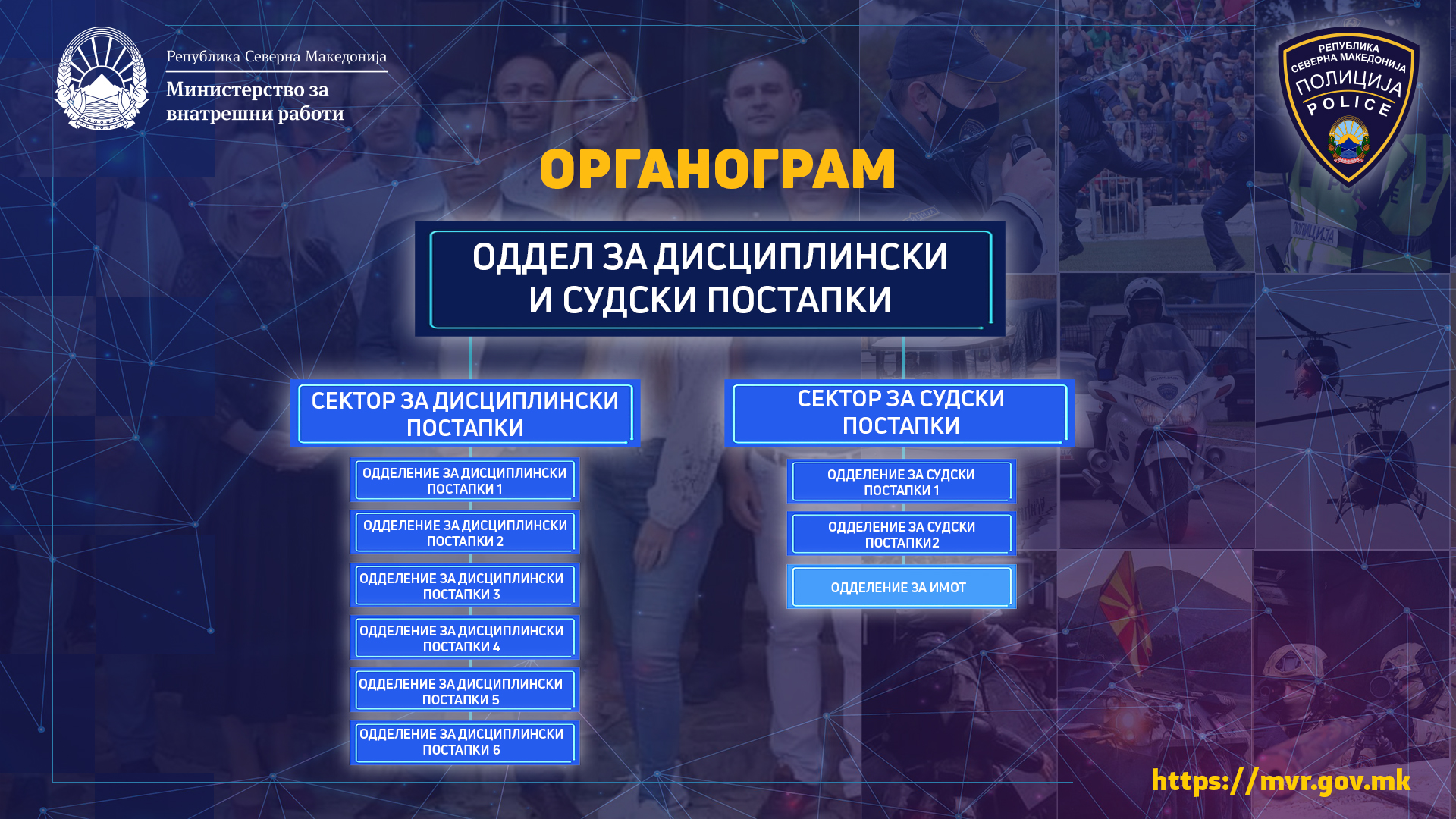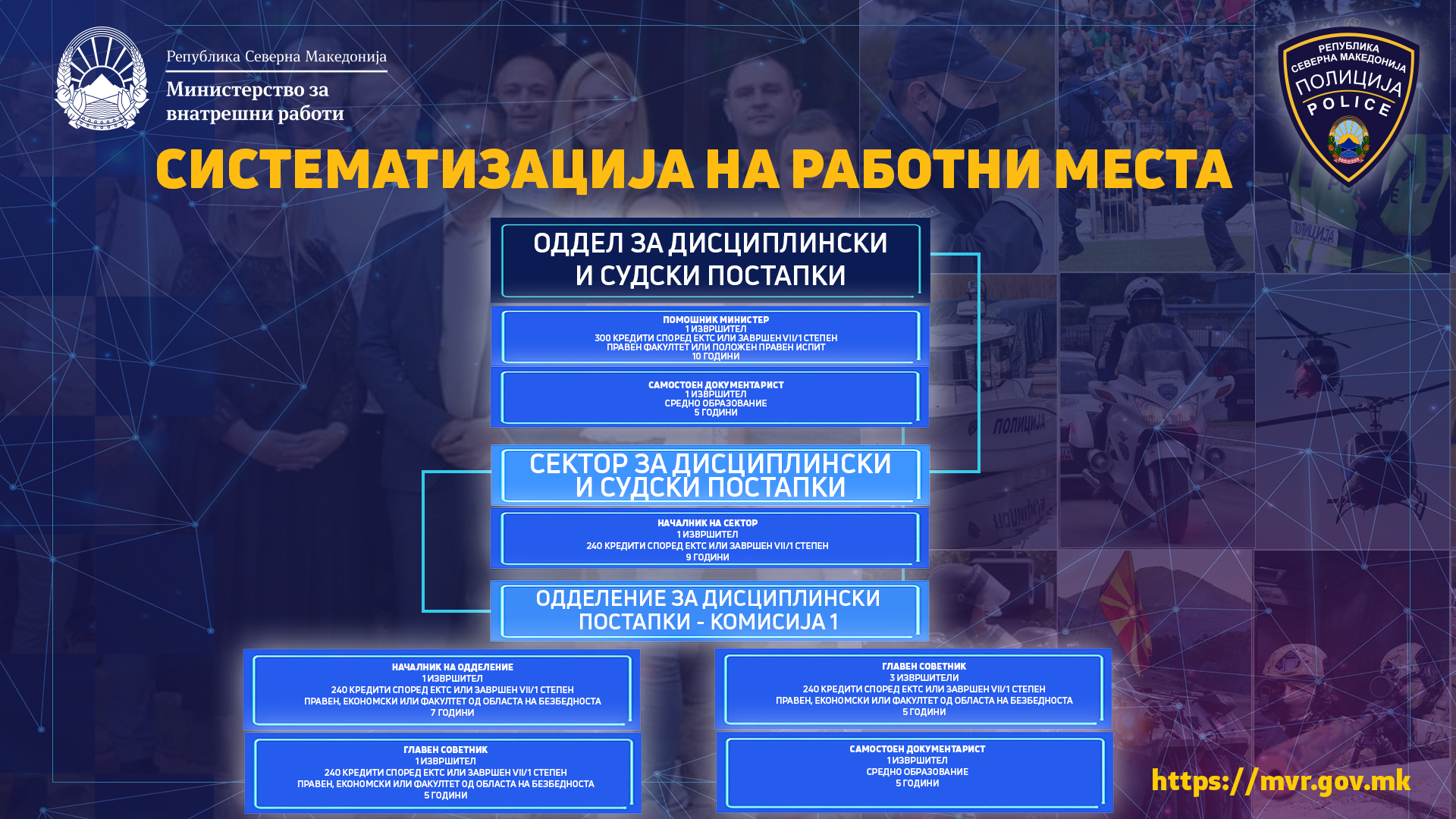During previous operations, particularly within the Ministry of Internal Affairs, a number of inconsistencies have been identified in the conduct of disciplinary proceedings. These include irregularities in the management of procedures, their duration, the imposition of disciplinary measures, and the influence of superiors on the type and severity of those measures.
Based on an analysis of imposed measures for the same or similar violations, it was concluded that there were discrepancies in the sanctions applied. This was assessed as a negative factor regarding the preventive and repressive role that disciplinary proceedings are intended to fulfill.
To improve the situation in the area of disciplinary procedures, and with the support of the OSCE, a working group was formed. Its task was to revise the disciplinary system within the Ministry to ensure greater consistency, and to promote adherence to order and discipline among employees.
The working group prepared a document titled “Assessment and Review of the Disciplinary Procedures System in the Ministry of Internal Affairs,” which was verified and promoted in September 2019. This document contains recommendations for changes to the concept of how disciplinary procedures are conducted.
In addition to this document, several specific reports have further reinforced the need for a comprehensive review of the disciplinary procedure system:
-
GRECO Report – Especially the recommendation to “Ensure autonomy and independence from undue influence over the internal control mechanism of the police, including adequate mandate, resources, and expertise (through the establishment of entirely new rules for conducting disciplinary proceedings for police officers). This will provide the Internal Control Unit with independence both from the police it oversees and from politically appointed individuals.”
-
National Strategy of the Republic of North Macedonia for Combating Corruption and Conflict of Interest – This document proposes that, to effectively detect and sanction irregularities, centralized disciplinary commissions should be established within the Ministry of Internal Affairs.
To this end, a working group was tasked with preparing a proposal for establishing a professional model for conducting disciplinary procedures within the Ministry. This includes its organization, structure, positioning, the necessary number of staff, and a full analysis of the legal amendments needed to regulate disciplinary processes within the Ministry.
Following the group’s activities and based on directives from the Ministry’s leadership, the possibility of professionalizing disciplinary commissions has been considered. The proposed model envisions the establishment of a separate organizational unit within the Ministry, dedicated exclusively to handling disciplinary procedures.
This model would ensure a high level of professionalism, objectivity, consistency, and efficient use of human resources within the Ministry of Internal Affairs.
This would imply the abolition of the current 12 disciplinary commissions and the full transfer of responsibilities related to disciplinary procedures to the newly proposed organizational structure.


The main responsibilities of the Department for Disciplinary Procedures include overseeing the disciplinary process, establishing standards for conducting procedures, implementing the entire disciplinary process, and preparing decisions for imposing disciplinary measures, which are to be made by the Minister of Internal Affairs.
In accordance with the recommendations outlined in the document "Assessment and Revision of the Disciplinary Procedures System in the Ministry of Internal Affairs," in addition to the primary responsibilities in conducting disciplinary procedures, it is proposed that the Department undertake activities aimed at:
-
Consistent application of legal regulations in determining responsibility for violations of work order and discipline, or failure to fulfill work obligations, especially concerning the obligation to report misconduct ("Code of Silence"), which should be addressed within disciplinary measures as a separate sanction for not reporting abuses or inappropriate behavior of colleagues.
-
Preventing inappropriate behavior among employees by establishing a mechanism for early warning (early prevention) through counseling, guidance, and training, particularly for those whose performance poses a high risk of disciplinary violations. This approach focuses on corrective measures rather than punishment, including training, mentoring, counseling, mutual agreements to improve efficiency, and enhancing responsibility among employees and leadership.
-
Active participation in creating a Disciplinary Matrix, classifying violations of work order and discipline into multiple levels/categories, distinguishing behaviors with minimal negative impact from those with significant consequences, based on established criteria such as recurrence, circumstances, and impact on the Ministry. The goal is to develop consistency and fairness in the disciplinary process, eliminating discrepancies and ensuring equal sanctions for similar offenses.
-
Continuous professional development through specialized training for employees in the Department for Disciplinary Procedures, study visits to enhance knowledge and capacity for analyzing and deciding on cases of determining disciplinary responsibility.
Thanks to cooperation with the OSCE, basic training on conducting disciplinary procedures has been organized, along with a study visit to the Netherlands, from which we anticipate gaining new insights and exchanging experiences to improve the department's capacities.
One of the Department's core commitments in executing its responsibilities is continuous professional development concerning the methods of conducting disciplinary procedures, with a particular focus on timely and effective implementation, strengthening the role and responsibility of supervisors regarding the actions of their subordinates, and monitoring and analyzing employee behavior.
Strategic Objectives of the New Department for Disciplinary and Judicial Procedures:
-
Revision of legal regulations governing the disciplinary procedures system (Law on Internal Affairs, Collective Agreement of the Ministry of Internal Affairs), and appropriate interventions in organizational and operational acts, including job classification within the Ministry.
-
Human resources – as a key factor for proper implementation of the model.
Considering that the disciplinary procedure is a procedural process, it is assumed that the managerial staff in the organizational unit should possess appropriate education – a Law degree, given that legal knowledge is essential for lawful and proper conduct of procedures.
Employees in this organizational unit are proposed to have at least 10 years of work experience (as before), with competencies, quality, expertise, and reputation among colleagues.
To achieve this, a continuous and long-term human resources planning process is proposed, to be implemented in cooperation with the organizational units responsible for human resources management in the Ministry of Internal Affairs.

